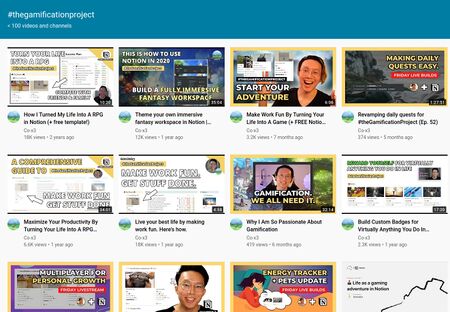Category:Productive Play: Difference between revisions
No edit summary |
No edit summary |
||
| Line 1: | Line 1: | ||
<div style='width:70%'> | <div style='width:70%'> | ||
[[File:Life-rpg.jpg|450px|float|right]] | |||
== Introduction == | == Introduction == | ||
Revision as of 18:22, 8 January 2022
Introduction
Social media, language learning apps, dating apps, mood-tracking apps, etc: the language of games repurposed in the context of data-extractivist software are just some of the examples of the blurring lines between play, leisure and labour releasing our collective dopamine for profit.
This trimester, gamification in its many forms will serve as a stepping stone to explore the many ways videogames, explicitly or implicitly, are making us more, not less, productive: predatory monetization schemes ( in-game advertising, micro-transactions, loot boxes, downloadable content, etc.), aspects of mod and fan culture, gold mining, etc.
Furthermore, according to author Vicky Osterweil, even when considered outside the direct sphere of production, videogames perform a reproductive role through the representation of capitalism as a system of natural laws through the dissemination of dominant ideologies, helping people function in an otherwise dysfunctional economy and society. Moreover, they may provide necessary down time and relaxation, allowing the worker to be regenerated and ready for another day.
Nonetheless, leisure is a contested space which is still unequally distributed. Associate professor Shira Chess proposes that feminist work must not only pay attention to leisure, but also to improving the quality of said leisure.
As such, how can we contribute to this project? Get ready to turn some of your leisure time into homework instead as we prod and poke the billion-dollar industry that always wants more.
Week 1
Tuesday, January 11th
- Kick-off Special Issue #17
Watching:
- "Roblox Pressured Us to Delete Our Video. So We Dug Deeper" : https://inv.riverside.rocks/watch?v=vTMF6xEiAaY
Assignment:
- In preparation for our class next week, read Chapter 7 of Rules of Play - Game Design Fundamentals: "Defining Games" by Katie Salen and Eric Zimmerman
Week 2
Tuesday, January 18th
- Defining play and games
- Blurrying the lines between labour and play: gamification and playbour
- Getting started on a glossary of productive play
Reading:
- "Taylorism 2.0: Gamification, scientific management and the capitalist appropriation of play", by Jennifer Dewinter, Carly A. Kocurek and Randall Nichols
- "Gamification as twenty-first-century ideology" by Mathias Fuchs
- "Selfwork" by Karen Gregory, Kirsty Hendry, Jake Watts and Dave Young
Assignment:
- In preparation for next week's session, please read the article 'Well Played" by Vicky Osterweil: https://reallifemag.com/well-played/
Week 3
Tuesday, January 25th
- Games as reproductive technologies: the base-superstructure model, Adorno and Horkheimer's critique of the cultural industry, Stuart Hall's deconstruction of the popular, introduction to social reproduction theory
- "Turning players into payers" / Predatory monetization schemes: in-game advertising, micro-transactions, loot boxes, downloadable content, NFTs, etc.
Reading/Watching:
- "The Addictive Cost Of Predatory Videogame Monetization (The Jimquisition)": https://www.youtube.com/watch?v=7S-DGTBZU14
- "Predatory monetization schemes in video games (e.g. 'loot boxes') and internet gaming disorder", by Daniel L. King and Paul H. Delfabbro
- http://icantbelieveitsnotgambling.com/
Week 4
Tuesday, February 1th
- Modding, machinima and fan culture: ambivalence between incorporated prosumerism and tactical media
Reading:
- "Productive Play: Game Culture From the Bottom Up" by Celia Pearce vs "The Multitude and the Media" from "Games of Empire" by Nick Dyer-Witheford and Greig de Peuter
- Chapter 2: "Game Modding: Cross-Over Mutation and Unwelcome Gifts" from "The Player’s Power to Change the Game" by Anne-Marie Schleiner
Public Lecture:
- Date TBC: Cory Arcangel: https://www.coryarcangel.com/
Week 5
Tuesday, February 8th
- From gold farming to Gamergate and the alt-right
Reading:
- "Smart Play: Social Stereotypes, Identity Building, and Counter Narratives of Gold Farmers in China" by Zixue Tai and Fengbin Hu in Woke Gaming (ed. Kishonna Gray and David Leonard)
- "Steve Bannon Saw the ‘Monster Power’ of Angry Gamers While Farming Gold in World of Warcraft" https://nymag.com/intelligencer/2017/07/steve-bannon-world-of-warcraft-gold-farming.html
- "Ctrl-Alt-Del: GamerGate as a precursor to the rise of the alt-right" by Kirstin MS Bezio
Week 6
Tuesday, February 15th
- Videogames as a possible arena for contesting feminist leisure
- Production mode: engage
Reading:
- "Chapter 2: PWNing Leisure" in "Play like a Feminist", by Shira Chess
- "Feminist game environment" by Natacha Roussel
Public Lecture:
- Date TBC: Shira Chess: https://grady.uga.edu/faculty/shira-chess/
Week 7
Tuesday, February 22th
- Production mode: engage
Week 8
Spring Holiday
Week 9
Study Week
Public Lecture:
- Date TBC: Paolo Pedercini: http://paolo.molleindustria.org/
Week 10
Tuesday, March 15th
- Editorial support
Week 11
Tuesday, March 22th
- Editorial support
Friday, March 25th
- Launch!
Pages in category "Productive Play"
The following 6 pages are in this category, out of 6 total.

